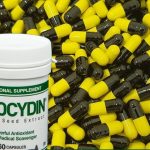Does Procydin Cause Weight Gain?

Procydin is a grape seed extract supplement that serves as a powerful antioxidant, supporting overall health and wellness. Its main ingredient, grape seed extract, is rich in proanthocyanidins, which are known for their ability to combat harmful free radicals in the body, thereby reducing oxidative damage to cells. By neutralizing these free radicals, Procydin helps promote a healthy immune system, support cardiovascular health, and protect against various chronic diseases.
The supplement also contains essential vitamins such as Vitamin E and Vitamin C, further enhancing its antioxidant properties. Vitamin E, a fat-soluble vitamin, plays a vital role in protecting tissues from oxidative stress and contributes to normal growth and development. Vitamin C, on the other hand, is crucial for collagen production, maintaining healthy blood vessels, gums, and teeth. Moreover, Vitamin C improves iron absorption from plant-based foods and collaborates with bioflavonoids present in Procydin to amplify its antioxidant effects.
Procydin’s unique formulation provides a synergistic combination of antioxidants, working together to combat oxidative stress and promote overall well-being. Regular consumption of this supplement, along with following the recommended dosage and consulting with a healthcare professional, can be a valuable addition to a healthy lifestyle and may contribute to maintaining optimal health and vitality. In this article, we shall be discussing the link between Procydin and weight gain.
Does Procydin Cause Weight Gain?
No, there are no specific ingredients in Procydin capsules that are known to cause weight gain. Procydin primarily consists of grape seed extract (proanthocyanidins), Vitamin C (as calcium ascorbate), bioflavonoids, and Vitamin E, which are all essential nutrients and antioxidants with various health benefits.
None of these ingredients have been linked to weight gain when consumed within the recommended dosage. In fact, some of them, like bioflavonoids and Vitamin C, have been associated with potential weight management benefits due to their antioxidant properties and potential effects on metabolism.
A study that investigated the link reported that supplements like Procydin promote weight loss rather than weight gain. According to the authors, grape seed extract is believed to delay the absorption of the diet, leading to reduced hunger and subsequently decreased food intake. In a year-long trial, it was observed that subjects experienced a 4 percent lower energy intake consistently throughout the study period. Based on this finding, the authors speculate that this reduction in energy intake could potentially result in a weight loss of 3.7 kg or prevent weight gain in individuals using grape seed extract as a supplement.
Findings from another study indicate that grape seed extract supplements, when administered in conjunction with a high-fat diet, may have a normalizing effect on various aspects related to body weight and lipid metabolism. Specifically, the supplementation appears to regulate body weight, epididymal and back fat weights, lipid concentrations, and carnitine levels. By doing so, it potentially helps in maintaining a healthier lipid metabolism profile despite the presence of a high-fat diet. These results suggest that grape seed extract could be a promising natural approach to support lipid metabolism and overall weight management in the context of a high-fat dietary intake. However, further research is needed to fully understand the underlying mechanisms and to confirm the effectiveness and safety of grape seed extract as a supplement for this purpose.
Research suggests that grape seed proanthocyanidin extract (GSPE) may have an antiobesity effect. Proanthocyanidins are potent antioxidants found in grape seeds, and GSPE is a concentrated form of these compounds.
Several studies have investigated the potential antiobesity properties of GSPE, and the results have been promising. GSPE has been shown to influence various factors related to obesity:
1. Lipid Metabolism: GSPE may help regulate lipid metabolism by reducing the synthesis and accumulation of fats in adipose tissue. It can also enhance the breakdown of fats, which may contribute to a reduction in body fat and the prevention of obesity.
2. Appetite Regulation: Some research suggests that GSPE may influence hormones that control appetite, leading to decreased food intake and a feeling of fullness, which could help in weight management.
3. Anti-Inflammatory Effects: Chronic inflammation is associated with obesity, and GSPE’s anti-inflammatory properties may play a role in reducing obesity-related inflammation.
4. Blood Glucose Regulation: GSPE has been shown to improve glucose metabolism and insulin sensitivity, which are important factors in preventing obesity and managing weight.
However, it’s important to note that while GSPE-containing supplements like Procydin show promise as a potential antiobesity agent, they should not be considered a standalone solution for weight management. A healthy lifestyle that includes a balanced diet, regular physical activity, and overall caloric balance is crucial for effective and sustainable weight management. As with any supplement, it’s best to consult with a healthcare professional before using Procydin or any other dietary supplement, especially if you have existing health conditions or are taking other medications.





